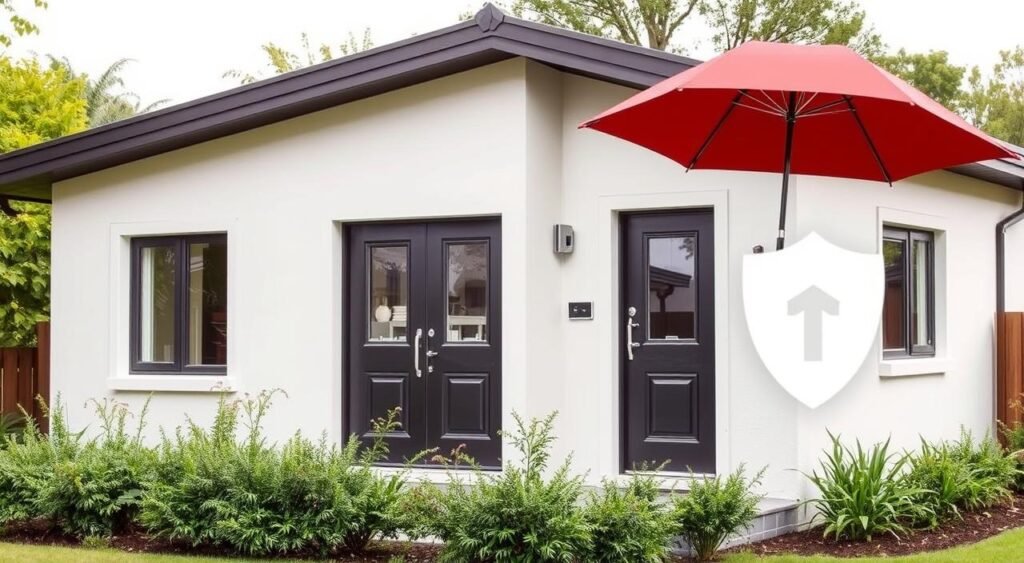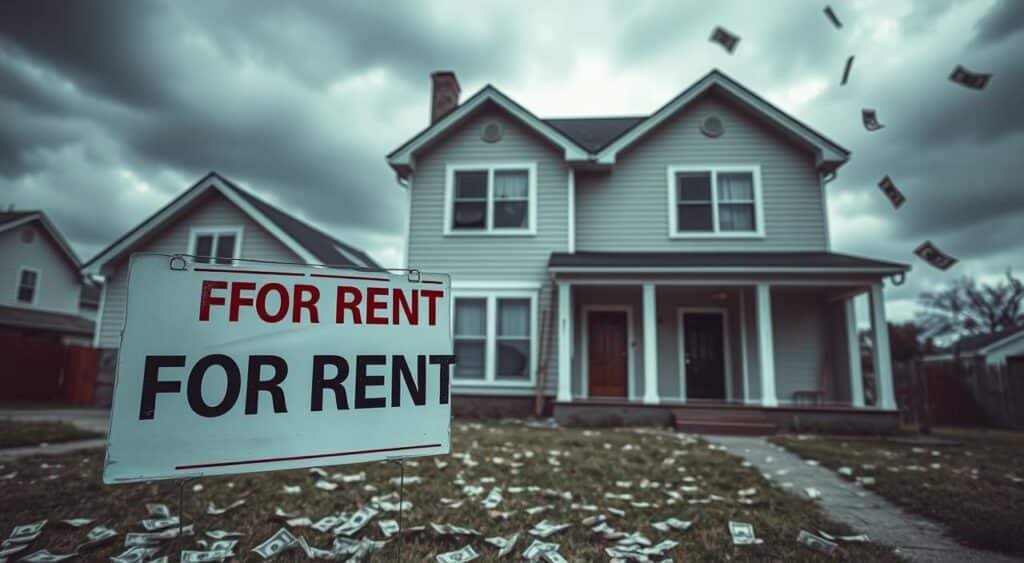Landlord insurance is a special kind of property insurance for those who rent out their properties. It helps protect against financial losses, covering damage, liability, and lost rent. It’s different from homeowners insurance, which is for homes lived in by the owner. Landlord insurance is more expensive, costing about 15% more, because rental properties come with more risks.
Key Takeaways
- Landlord insurance covers property damage, liability, and lost rental income for rental properties.
- It provides protection beyond what a standard homeowners policy offers, addressing the unique risks of being a landlord.
- Landlord insurance is essential for mitigating financial risks associated with renting out real estate.
- Understanding policy coverage, limits, and optional endorsements is crucial when purchasing landlord insurance.
- Landlord insurance typically costs about 25% more than homeowners insurance due to the increased risks of rental properties.
What is Landlord Insurance and Why You Need It
Landlord insurance is a special kind of property coverage for those who rent out homes. It’s different from homeowners insurance because it protects against the risks of renting. With more rental homes popping up, getting landlord insurance is key to protecting your investment.
Key Components of Coverage
Landlord insurance covers damage from fires, severe weather, or crime. It also protects you from lawsuits if someone gets hurt on your property. Plus, it can help if you lose rental income because of damage.
Differences from Homeowners Insurance
Landlord insurance and homeowners insurance are not the same. Landlord insurance doesn’t cover a tenant’s stuff or fix appliances. It’s also about 15% pricier because renting is riskier.
Also Read: Dual Degree Programs: Boosting Your Career Potential
Legal Requirements and Recommendations
While you don’t have to have landlord insurance everywhere, lenders might ask for it. Many owners choose to get it to protect their money and avoid big risks. Getting both homeowners and landlord insurance from the same company can even save you money.
As the rental market grows, so does the need for landlord insurance. It’s a vital tool for keeping your rental business safe and stable.
Core Coverage Types for Property Protection

Landlord insurance has several key coverage types to protect your rental property. Dwelling coverage helps rebuild the main structure if it’s damaged by events like fire or windstorm. Other structures coverage also protects detached buildings, like garages or sheds.
Personal property coverage keeps safe any items you own for the rental, such as appliances or furniture. It’s important to have enough dwelling coverage to rebuild the property fully, not just its current value.
- Dwelling coverage: Protects the primary rental structure
- Other structures coverage: Shields detached buildings like garages or sheds
- Personal property coverage: Safeguards landlord-owned items used to service the rental
- Replacement cost coverage: Ensures full rebuilding in the event of a total loss
Knowing these coverage types helps landlords choose the right insurance for their properties. With the right protection, you can relax and expand your real estate portfolio.
Also Read: From Fiber To Fantasy: Textile Artists Who Bring Stories To Life
Liability Protection and Risk Management

As a landlord, protecting yourself from legal and medical costs is key. Liability insurance helps cover these costs if someone gets hurt on your property. It usually has higher limits than homeowners insurance because rental properties are riskier.
Common Liability Risks for Landlords
Landlords face many liability risks. These include slip and fall accidents, structural problems, and injuries from broken appliances. Such incidents can lead to expensive lawsuits and settlements. So, having strong liability protection is crucial to protect your assets.
Legal Defense Cost Coverage
Many landlord insurance policies include legal defense cost coverage. This helps pay for lawyer fees and court costs if you’re sued. It’s a great way to make sure you can defend yourself well if someone sues you.
Also Read: How Third Party Liability Insurance Protects You In Accidents
Understanding the need for liability protection and managing risks helps landlords keep their properties safe. It also protects their financial interests.
“Proper liability coverage is essential for landlords to safeguard their investments and personal assets in the event of an unexpected incident on their rental property.”
Understanding Loss of Rental Income Coverage

As a landlord, your rental properties are key to your income and financial health. If a covered event like fire or storm makes your property uninhabitable, losing rental income can be tough. That’s where loss of rental income coverage comes in, offering crucial protection.
This insurance pays you for the rent you’d have gotten while fixing your property. It helps keep your cash flow steady, even when repairs take a while. This way, you can avoid financial trouble while you get your property back in shape.
Also Read: Exploring Campus Life: A Student’s Journey
Most landlord insurance policies have this coverage. It covers lost rent due to insured events like fire or windstorms. This coverage lasts until your property is safe again or until the policy’s time limit, usually 12 months or less.
But, this coverage doesn’t help if a tenant doesn’t pay rent. Also, some events like flooding or earthquakes might not be covered. So, it’s key to know what your policy includes and excludes.
- Check your landlord insurance policy to know what’s covered, what’s not, and for how long.
- Talk to your insurance provider or a specialist, like Obie, to make sure you have enough coverage.
- Take steps like regular upkeep and careful tenant screening to lower the risk of damage.
By using loss of rental income coverage, you can protect your rental business. This way, you can keep your finances stable, even when unexpected problems arise.
Also Read: The Different Types of Art Schools Explained
Property Damage and Structural Protection
Landlord insurance helps protect rental property owners from many potential damages. It covers things like fire, windstorms, hail, and vandalism. This ensures the property and its parts are fixed or rebuilt if damaged.
Coverage for Natural Disasters
Landlord insurance usually covers common damages, but natural disasters can be different. Flood and earthquake protection often need their own policies or riders. It’s important to check the policy to know what’s included and what’s not.
Also Read: Disability Insurance: Key Facts You Should Know
Vandalism and Tenant Damage Protection
Damage from tenants is a big worry for landlords. Insurance usually covers vandalism and accidental tenant damage. But, it might not cover intentional damage. This shows why it’s key to screen tenants well and have clear lease agreements.
Additional Structure Coverage
Insurance might also cover extra structures like garages or sheds. This helps pay for repairs or rebuilding of these parts. The coverage amount can vary, so it’s vital to understand the policy’s terms and limits.
FAQs
Q: What is landlord insurance and what does it cover?
A: Landlord insurance is a specialized type of insurance designed for property owners who rent out their homes or apartments. It typically covers property damage, liability claims, and loss of rental income. Key coverages often include landlord insurance coverage for the building itself, personal liability coverage, and additional coverage options for specific risks.
Q: How much does landlord insurance cost?
A: The cost of landlord insurance varies based on factors such as location, property value, and coverage options. On average, the landlord insurance cost can range from $800 to $1,200 annually, but it’s essential to get a quote from different insurance companies to find the best rate.
Q: Are there different types of coverage available within landlord insurance?
A: Yes, landlord insurance offers various coverage options. These can include property coverage for the building, contents, liability coverage, loss of rental income, and additional coverage for risks like flood insurance or natural disasters.
Q: Can I get affordable landlord insurance in Texas?
A: Yes, many insurance agencies offer affordable landlord insurance in Texas. It’s recommended to compare insurance quotes from multiple carriers to find the best rates and coverage that suit your needs.
Q: What discounts are available for landlord insurance?
A: Many insurance companies provide landlord insurance discounts for bundling policies, having security features, or being claims-free. It’s advisable to ask your insurance agent about potential discounts when obtaining a landlord insurance quote.
Q: How can renters insurance affect my landlord insurance?
A: Renters insurance typically covers the personal belongings of tenants and their liability. While it doesn’t directly impact your landlord insurance, having renters insurance in place can reduce liability risks and potential claims against your landlord insurance policy.
Q: What happens if a tenant causes damage to my rental property?
A: If a tenant causes damage, your landlord insurance will generally cover the repair costs, minus any deductible. It’s important to ensure that your landlord insurance coverage includes provisions for tenant-related damages.
Q: How do I get a landlord insurance quote?
A: To get a landlord insurance quote, you can contact various insurance carriers or use online quote comparison tools. Be prepared to provide details about your rental properties, coverage needs, and any existing insurance policies you may have.
Q: What is the difference between landlord insurance and homeowners insurance?
A: Homeowners insurance is designed for owner-occupied residences, covering personal belongings and living expenses. In contrast, landlord insurance is tailored for rental properties and includes coverage for potential tenant-related risks and loss of rental income.
Q: What type of coverage should I consider for my rental properties?
A: When choosing coverage for your rental properties, consider a comprehensive landlord insurance policy that includes property coverage, liability coverage, loss of rental income, and any additional coverage you may need, such as flood insurance or personal liability coverage.
Source Links
- https://www.hemlane.com/resources/what-is-landlord-insurance/
- https://www.tampabaypropertymanagement.net/blog/a-comprehensive-guide-to-landlord-insurance
- https://www.ramseysolutions.com/insurance/landlord-insurance?srsltid=AfmBOoqiKH3XadQDfG0dL6ol0kLOTDnWPI0zoBYSMl4Mi78sCaf9wjvJ





